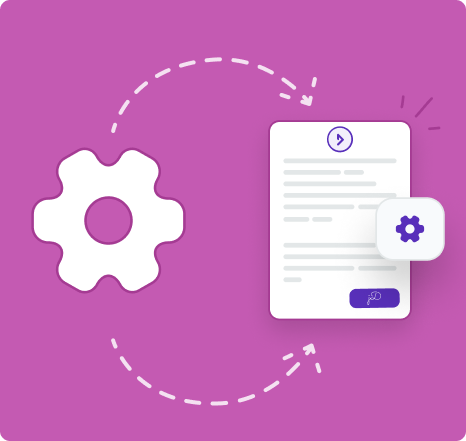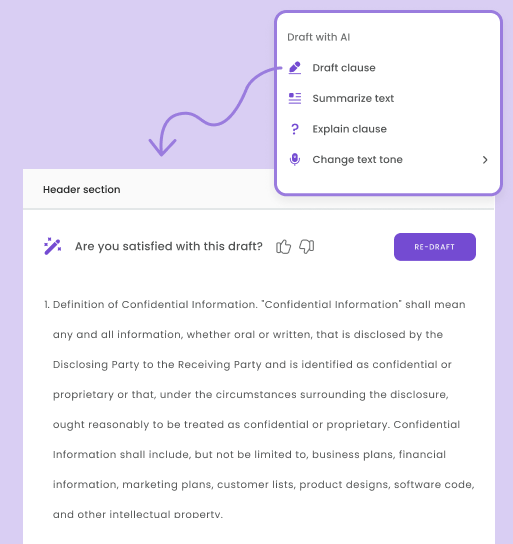As contracts become more and more complex, more regulations are passed, and people work from more remote locations, contract lifecycle management becomes more important. If you’ve ever had to handle more than a few contracts at a time, you know how difficult it can be to juggle all the moving pieces.
That’s where contract lifecycle management software comes into play. It allows you to handle multiple phases of contract management in a single system and make your job much easier.
In this guide, you’ll get a deeper understanding of contract lifecycle management software, see the most important features, and also receive a rundown of the best contract lifecycle management tools available right now.
What is contract lifecycle management software?
Contract lifecycle management (CLM) software is a type of software that helps you manage the entire lifecycle of your contracts. This goes from creation and negotiation to execution and renewal. CLM software allows you to store, manage, and track all of your contracts in a centralized location, making it easy to access and retrieve information when needed. The software automates many of the manual processes associated with contract management, saving time, and reducing the risk of errors.
The key features of CLM software include:
- Contract creation: Contract creation is one of the core features to look for when it comes to CLM software. It’ll allow you to create new contracts quickly and efficiently. The software can generate new contracts from templates, reducing the time and effort required to create new contracts.
- Contract storage and organization: CLM software stores all contracts in a centralized location, making it easy to access and retrieve contracts as needed. The software can organize contracts based on various criteria, such as contract type, vendor, and expiration date.
- Workflow management: CLM software automates the contract approval process, reducing the risk of delays and errors. The software can route contracts to the appropriate parties for review and approval and can track the status of each contract throughout the approval process.
- Contract compliance and risk management: CLM software can help you ensure compliance with regulations and reduce risk. The software can alert businesses to upcoming contract expirations, notify them of important deadlines, and track changes made to contracts.
- Analytics and reporting: CLM software provides analytics and reporting capabilities that help businesses understand their contract portfolio. The software can generate reports on contract activity, contract performance, and contract compliance.
Overall, CLM software helps you streamline and optimize your contract management processes, reducing the risk of errors and improving efficiency. By automating many of the manual processes associated with contract management, you can save time and focus on other important tasks.
Now, let’s look at the best contract lifecycle management software available right now.
Best contract lifecycle management software
1. DoxFlowy – best all-around contract lifecycle management software

DoxFlowy is a robust, cloud-based contract lifecycle management and document automation software. It focuses on allowing you to create contracts and other documents in a fraction of the time and allows you to cover most, if not all, of the contract lifecycle.
It has a powerful document editor that you can use to draft your contracts and properly format them. You can add headings, bullets, italics, headers, footers, and more. You can also set up conditional logic for your contract templates so that a unique contract can be created depending on the inputs provided.

You can redline and do the latter half of your negotiations with the editor. This is made possible by granular access permissions, which allow you to add users to specific documents and choose how much editing access they have.
After creating the initial draft, you can also choose from multiple settings for the document. For example, the output format, the size of the document, and how the end user interacts with it.

Within DoxFlowy, data for contracts can be collected using forms. You have complete control over the look and feel of the forms as well as the questions and question types. Of course, you have the ability to choose what happens after the document has been created. That includes setting up notifications, signing, triggering processes in third-party apps, and much more.

The main emphasis of DoxFlowy is to slash your contract drafting time to just a few minutes with its strong automation and document assembly features. Beyond creating the contract, you can automate the majority of the process that happens afterward as well.
Key features
- Powerful contract editing tools
- In-built contract redlining tools
- Conditional logic
- Template management
- Document settings
- Electronic signatures
- Contract negotiation and redlining
- Analytics for documents and forms
- Document automation
- Contract assembly and generation
- Document settings management
- Form customization
- Team management
- Central document repository
- Folder organization
Pros and cons
Pros:
- Intuitive interface
- Strong document editor
- Third-party integrations
- Built-in electronic signatures and audit trail
Cons:
- Contract execution tracking is lacking
Pricing
DoxFlowy has three pricing plans: Core, Team, and Business.
Core is $99/m and $25/m/user. Team is $199/m and $49/m/user. Business is $499/m and $99/m/user
2. Concord

Concord is a cloud-based contract management platform that enables users to streamline and automate the contract lifecycle. It offers a secure and collaborative platform for creating, negotiating, and executing contracts, as well as storing and analyzing contract data. Concord aims to simplify contract management processes, improve contract compliance, and reduce risks associated with contracts.
Key Features:
- Contract creation and editing tools
- Contract negotiation tools
- Electronic signatures
- Simple contract reports
- Workflow automation
- Document repository
- Strong search functionality
- Renewal reminders
Pros and Cons:
Pros:
- Easy-to-use interface and intuitive editing tools.
- Collaborative contract negotiation features.
- E-signature and workflow automation capabilities.
- High-level security and compliance measures.
Cons:
- Limited customization options for contract templates.
- Limited integrations with other software and tools.
Pricing:
Concord offers three pricing plans: Standard, Pro, and Enterprise.
The standard plan is $23/m/user the Pro plan is $59/m/user and the enterprise plan is available upon request.
3. Gatekeeper

Gatekeeper is a contract management solution that can be accessed via an internet connection and is designed for small to midsize businesses. It helps streamline the contract management process, allowing you to track contract status, create custom workflows, and set up automated alerts. The platform aims to increase efficiency, mitigate risks, and reduce costs associated with manual contract management processes.
The platform, at times, feels dated but that doesn’t take away from the features it provides for users. Spend a bit of time learning it and you may be pleasantly surprised at what it brings to the table.
Key Features:
- Contract repository
- Credit and risk profiling tools
- Custom workflows
- Automated alerts:
- Contract authoring and creation
- Template management
- Collaboration tools:
Pros and Cons:
Pros:
- Useful risk assessment tools
- Customizable workflows to fit business processes
- Automated alerts and notifications
- Provides a centralized repository for all contracts
- Comprehensive search capabilities
Cons:
- Limited customization options for reports
- Integrations with other systems may require additional customization
Pricing:
- Essentials: $995/month paid annually
- Pro: $2,415/month paid annually
- Enterprise: $4,285/m paid annually.
Gatekeeper is much more expensive than many of the tools on this list which is compounded by the need to pay annually.
4. ContractWorks

ContractWorks is a contract management application designed for businesses of all sizes but it leans towards the enterprise side. The platform is user-friendly, and its intuitive interface allows users to easily manage and track their contracts.
The platform has an emphasis on making sure you stay on top of contract renewals and the ability to draft contracts in a fraction of the time with its document assembly tools. At the end of the day, ContractWorks helps you streamline the contract management process, automate workflows, and reduce risk.
Key Features:
- Contract repository:
- Custom contract workflows.
- Automated alerts
- OCR technology:
- Template management
- Team management
- Contract editor and document creator
- Electronic signature
- Approvals management
Pros and Cons:
Pros:
- User-friendly interface
- Customizable workflows to fit business processes
- Automated alerts and notifications
- Comprehensive search capabilities
- OCR technology to make scanned documents searchable
Cons:
- Limited integrations with other systems
- Limited reporting capabilities
- Pricing is higher compared to some other contract management solutions in the market
Pricing
- Standard: $700/month billed annually
- Professional: $900/month billed annually
- Premium: $2,000/m billed annually
5. Outlaw

Get Outlaw is a cloud-based contract lifecycle management software designed for small and midsize businesses. It offers a range of features to help businesses streamline their contract management process, from contract creation to execution and storage.
Outlaw tries to cover the entire contract lifecycle and does a decent job with the features it has available. It also takes advantage of simple AI to further enhance your efficiency. The vault feature is a nice touch as it has a searchable database of all your contracts which makes it much easier to retrieve relevant documents.
Key Features:
- Contract authoring.
- Customizable workflows
- Contract repository
- Strong search and discovery tools
- Electronic signatures
- Automated alerts
- Collaboration tools
- Team management
- AI-powered contract review
Pros and Cons:
Pros:
- User-friendly interface
- Customizable workflows to fit your business processes
- Automated alerts and notifications
- AI-powered contract review for potential issues
Cons:
- Limited integrations with other systems
- Limited reporting capabilities
Pricing
Outlaw doesn’t have set pricing because it’s custom for every customer. You’ll need to contact them directly to get a quote.
6. Precisely

Precisely is a robust contract lifecycle management solution that’s carefully considered the entire contract lifecycle and created a solution around it. From creation to archival, there’s likely a tool provided by Precisely. It’s targeted at businesses that have multiple departments that need to optimize their contracting processes rather than small businesses that may have one central location for contracts.
The platform is user-friendly, and its intuitive interface allows you to easily manage and track their contracts. While there’s no standout feature of Precisely, it does a lot of little things right that ties it into a comprehensive whole. For example, the approval process can be set up based on custom rules and electronic signatures are a breeze to use.
Features:
- Contract repository
- Custom contract and approval workflows
- Automated alerts
- Document editor
- Contract automation
- Contract authoring:
- Collaboration tools
- Electronic signatures
- Team management
Pros and Cons:
Pros:
- Easy-to-learn interface
- Fits most steps in the contract lifecycle
- Easily set up alerts and notifications
- Comprehensive search capabilities
Cons:
- It can be sluggish to load at times
- Limited document customization and formatting options
d. Pricing: Pricing for Precisely is not publicly available on the website, and users are required to contact the sales team to obtain pricing information.
With that being said, it does offer pricing ranges you can expect to pay.
- $995/m for a single department and around $5995/m for an entire organization.
7. PandaDoc

PandaDoc’s contract management solution is a cloud-based software that allows businesses to streamline their contract management process from creation to signature. The platform is designed to help businesses reduce manual tasks, automate workflows, and accelerate the sales cycle.
PandaDoc’s contract management is ideal for small and medium-sized businesses that want to automate their document workflow and close deals faster. The emphasis is clearly on sales teams and it has features and tools to help that specific customer base succeed like quotes and estimate management.
Features
- Customizable templates
- Quote and estimates management
- Collaboration tools
- Electronic signatures
- Automated workflows
- Analytics: The platform provides detailed analytics on contract performance, enabling businesses to make data-driven decisions.
- Document automation
- Template library
- Integrations with third-party tools
Pros and Cons:
Pros:
- User-friendly interface
- Comprehensive analytics for data-driven decisions
- Large integration library
- Excellent customer support
Cons:
- The application has been known to be slow at times
- Lacks conditional logic for the forms
Pricing:
- Essentials: $29/month per user
- Business: $59/month per user
- Enterprise: Custom pricing
8. ContractSafe

ContractSafe is a cloud-based contract management software designed for small and medium businesses. It has an emphasis on security and discovery. Put another way, it wants to make sure your contracts remain safe while making it easy to find relevant documents.
When you’re getting started, you can use an optional service for the team to help you get your older contracts online and within your digital contract management workflow.
Key Features:
- Contract repository:
- Customizable workflows
- Automated alerts and renewal notifications:
- Electronic signatures
- Collaboration tools
- Approval management
- Unlimited users on all plans
- Search scanned documents (OCR technology)
- AI contract management assistant
Pros and Cons
- Document migration from current systems
- Customer success manager
- Search almost any type of document
- Simple reminders and alert notifications
Cons:
- Limited integrations with other systems
- No electronic signature functionality
Pricing:
Basic $395 a month
Standard $695 a month
Professional $935 a month
Enterprise $1,199 a month
How to Choose the Right Contract Management Software
Choosing the right contract management software is a critical decision and depends on multiple factors. The following are some key considerations to keep in mind when selecting contract management software:
- Budget: One of the most important considerations when selecting contract management software is the budget. Look for software that provides the required features within your budget. Some software offers a free trial, which allows you to evaluate the software’s features and benefits before investing. It is important to consider the long-term cost of the software, including any ongoing maintenance or subscription fees and not just the monthly subscription.
- Business size and needs: Smaller businesses with limited contracts may require basic features such as contract creation and storage. Larger businesses may need more advanced features such as automated workflows, reporting, and analytics. Some of the features may seem nice but do you really need them? Create a shortlist of the essential features that must be available. Anything outside that list can be ignored – at least in your initial assessment.
- Integration with other software: Select software that integrates seamlessly with existing systems such as CRM, ERP, and HR software. Integration reduces manual data entry and improves data accuracy, saving time and improving efficiency.
- Customization options: Try to find tools that offer customization options at various touchpoints. For example, the documents, the forms, the hosted pages, etc. Going beyond that, how much can you customize the document you’re working with? Customization options can include templates, workflows, and contract fields. The ability to customize the software ensures that it meets the specific needs of the business and increases user adoption.
Conclusion
Contract lifecycle management software isn’t a one-size fits all area. Each business is unique and what may work for some, may not work for others.
This list has shown you some of the best contract lifecycle management software out that. More importantly, it has given you insights into the key features and what to think about when choosing yours.
Now, it’s time for you to do further research and select the contract management tool that’s right for you. Be sure to check out DoxFlowy and reach out to us if you have any questions.




